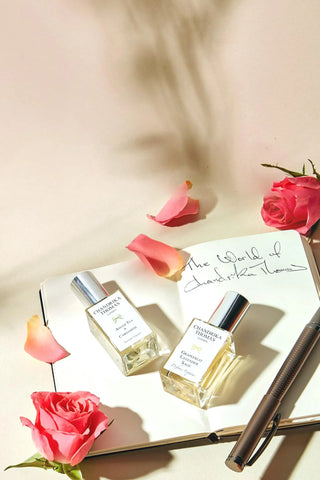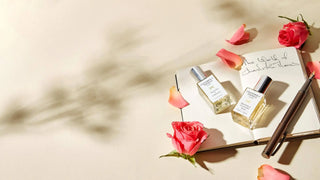With its timeless allure and sophistication, Rose has cemented its place as a quintessential ingredient in perfumery. The significance of rose notes in perfumery is undeniable, as they bring a touch of romance and elegance to a wide range of fragrances.
In this note, we'll explore the various types of rose notes in perfumery, from the rich and complex Damask rose to the delicate and ethereal Centifolia rose. You will gain insights into how each rose note contributes to the overall scent profile of a perfume, and how these rose notes in fragrances can be used to create captivating and memorable scents.

The Significance of Rose in Perfumery
The use of rose in perfume dates back centuries, with historical records highlighting its role in ancient Egyptian, Roman, and Persian cultures. In Egypt, rosewater was used not only for its delightful fragrance but also in beauty rituals and religious ceremonies. Romans enjoyed the luxury of rose petals in their baths, while Persian cultures celebrated the rose for its role in crafting exquisite perfumes. This rich history underscores the enduring popularity of rose notes in perfumery and their significance in creating luxurious and cherished fragrances.
The rose's symbolism of love and beauty adds to its appeal in perfumery. The rose’s ability to evoke deep emotions and its association with romance make it a beloved ingredient in many perfumes. Rose notes are versatile, ranging from soft and delicate to rich and complex, and can complement a variety of fragrance profiles.


Types of Rose Notes in Perfumery
Damask Rose
Characteristics: Damask rose is known for its rich, complex scent profile, which combines sweet, floral, and slightly fruity notes. The fragrance is warm and spicy, adding depth to any composition.
Usage: Damask rose in perfume is a popular choice for high-end and luxurious fragrances. Its multifaceted aroma makes it a favourite for creating elegant and sophisticated perfumes. This rose type is often used in oriental and chypre fragrances to enhance their richness and complexity.

Centifolia Rose
Characteristics: The Centifolia rose, often referred to as the “hundred-petal rose,” has a delicate and sweet fragrance with light, airy floral and fruity notes.
Usage: Centifolia rose fragrance is ideal for crafting fresh and light perfumes. It is commonly used in spring and summer scents, offering a romantic and uplifting aroma. Its gentle sweetness is perfect for everyday wear and casual elegance.
Turkish Rose
Characteristics: Turkish rose has a deep, intense scent with bold, spicy, and slightly woody undertones. It offers a rich and opulent fragrance profile.
Usage: Turkish rose perfume is used to create bold and dramatic scents. Its powerful aroma is suited for evening wear and special occasions. This rose type is often found in luxurious and exotic fragrances that aim to make a statement.
Persian Rose
Characteristics: Persian rose boasts a unique and exotic fragrance, blending traditional floral notes with subtle spicy hints. It has a warm and resinous aroma.
Usage: Persian roses are employed in perfumery for luxury and oriental fragrances. Its distinct scent profile blends beautifully with spices and resins, creating sophisticated and captivating perfumes. Persian rose adds a touch of mystery and allure to any fragrance.


Floral Notes in Perfume
Rose Scent Profiles and Fragrance Families
Rose fits seamlessly into the broader category of floral notes in perfume, which includes other ingredients such as jasmine, lily, and violet. The rose’s presence enhances the overall bouquet of a fragrance, contributing depth and complexity. It can blend with other floral ingredients to create diverse scent profiles, ranging from romantic and soft to bold and sophisticated.
Rose essence, extracted through steam distillation or solvent extraction, captures the full range of the rose’s aromatic qualities. This essence is crucial in creating various rose scent profiles, from delicate top notes to rich base notes. The quality of rose essence can significantly impact the final fragrance, making it a vital component in perfumery.
Rose is a key player in several fragrance families, each offering a different interpretation of its scent. In floral fragrances, roses add a classic and romantic touch. In oriental fragrances, it contributes warmth and depth, blending with spices and resins. In chypre fragrances, rose provides a sophisticated, nuanced element that complements other complex ingredients, resulting in a balanced and harmonious composition.

Blending Rose with Other Notes
When blending a rose with other fragrance notes, it is important to consider how each note interacts with the rose’s inherent characteristics. Rose pairs beautifully with woody notes, such as sandalwood or cedarwood, adding depth and sophistication. It also blends well with spicy notes, like cardamom or cinnamon, creating a warm and inviting aroma. Citrus notes, such as bergamot or lemon, can provide a refreshing contrast to the rose’s sweetness, resulting in a vibrant and balanced scent.
Achieving a harmonious blend involves carefully selecting and balancing complementary notes. Start by experimenting with different ratios to find the right balance between the rose and other ingredients. Testing and adjusting the blend will help you create a fragrance that feels cohesive and well-rounded. Consider how each note contributes to the overall scent profile and ensure that the rose’s character remains prominent while integrating seamlessly with other elements.

My Rose Perfume Recommendations
For those seeking to explore rose fragrances, here are my recommendations from our collection:
Allure Rose Blossom Oud
This fragrance features a sensual rose woven into a tapestry of oud and wood smoke. The addition of a subtle touch of spice creates an olfactory journey that is both rich and intriguing, reminiscent of luxurious cognac.
Persian Rose
A perfume built around a sparkling rose accord, this scent intertwines the essence of morning dew with ylang-ylang flowers. Top notes of pear and amaretto seed contribute to its refreshing nature, while light, musky tones add a touch of subtle enchantment.
Rose, Orange Blossom & Cardamom
This fragrance combines fiery notes of pink pepper, cardamom, and nutmeg with vibrant citrus accords of petitgrain, lemon, bergamot, and mandarin. The heart of rose and jasmine is gracefully supported by warm undertones of olibanum, patchouli, and musk.
Silk Tulle & Chantilly Lace
Opening with a citrusy burst of lemon and mandarin, this fragrance transitions into a heart of peonies and rose essence, before settling into a warm base of woody notes. The result is a well-rounded and elegant scent profile.


With my passion for fragrances, I highly recommend exploring roses as a key ingredient in your fragrance journey. Rose remains one of the most exquisite and versatile scent profiles, celebrated for its rich, multifaceted nature that can evoke everything from romance to opulence. Its timeless elegance and complex character make it a standout choice for creating memorable and sophisticated fragrances. I encourage you to try and explore the world of rose in perfumery, it remains one of the best and most captivating scent profiles out there.






